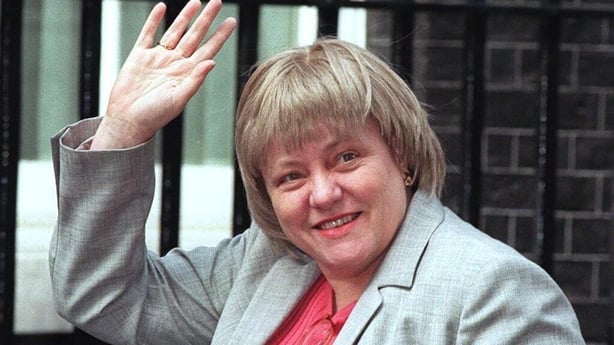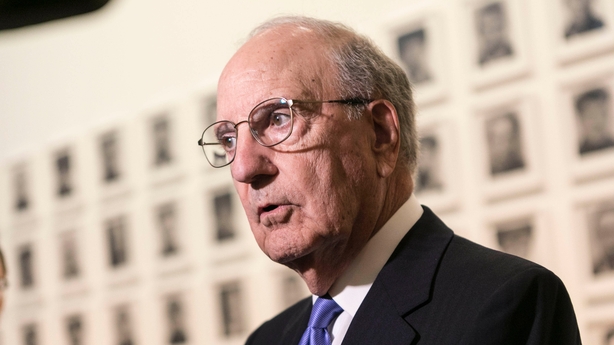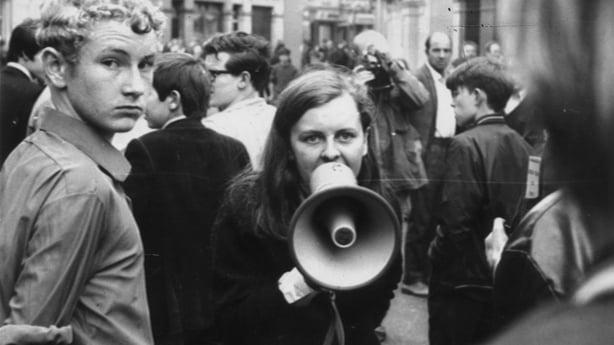25 years after the Good Friday Agreement was signed at Stormont in Belfast and “sectarianism is still part and parcel of everyday life in Northern Ireland”, according to journalist Emma DeSouza.
She said that despite the achievements of the agreement, young people in Northern Ireland are still growing up under the same system of segregation as their parents and grandparents.
Speaking to Áine Lawlor on a special The Week in Politics podcast to mark the anniversary of the historic agreement, she said there is evidence that “shows that Northern Ireland still has a brain drain”.
“The majority of young people are leaving and they’re not coming back,” she said.
“When you ask them why it is that they’re leaving Northern Ireland and not returning, it’s because of the divisions, it’s because of the conflict. It’s because we’re not a reconciled place. Not yet.”
We need your consent to load this rte-player contentWe use rte-player to manage extra content that can set cookies on your device and collect data about your activity. Please review their details and accept them to load the content.Manage Preferences
On the same podcast Bríd Rodgers, one of the founding members of the SDLP, said Northern Ireland is really missing “courageous leadership” at the moment.
Ms Rodgers who was a member of the SDLP negotiating team in the talks that led to the Good Friday Agreement, said the job now was to deliver on the potential of the deal.
“I think that that whole idea of reconciliation and real partnership has got lost along the way. We need to get back to the spirit of the agreement. Partnership is the best thing we’ve got for the future. It’s not going to be easy, but it’s the right thing to do.”
We need your consent to load this rte-player contentWe use rte-player to manage extra content that can set cookies on your device and collect data about your activity. Please review their details and accept them to load the content.Manage PreferencesShe said Northern Ireland was missing the kind of leadership which was shown in those talks by the late David Trimble, the former leader of the Ulster Unionist Party.
“He was not only dealing with dissension within his own party, but also in the ranks of the DUP, who were criticising every move, and yet he had the leadership and the courage to deliver the peace process.
“I think the problem now is that there are still people who will not recognise that what happened in the past was wrong. And that is feeding into what we’re seeing now with the dissidents. So, there is leadership still required right across the island, on all sections and of all leaders.”
Monica McWilliams, who co-founded the Northern Ireland Women’s Coalition and was a delegate at the multi-party talks in Stormont in 1998, said the contribution made by many women to the Good Friday Agreement was often overlooked.
She said at the time many male politicians publicly criticised her and other women saying in interviews in the media that they had “nothing to offer”.
“We were told, the only table you should be at is the table you’re going to polish.”
According to Ms McWilliams, many of the clauses in the Good Friday Agreement around victims’ rights and integrated education made their way into the text because they were promoted and supported by the women involved in the process.
She described the contribution made to the talks by the late Northern Secretary Mo Mowlam as immense.
“She had emotional intelligence, as well as intellectual intelligence. And she brought both of those to the peace talks. I saw her on the last night, barefoot, no wig, an intravenous drip in her arm and running around the corridors between the parties, between the rooms, with everything at stake, and massive tension.”
We need your consent to load this rte-player contentWe use rte-player to manage extra content that can set cookies on your device and collect data about your activity. Please review their details and accept them to load the content.Manage Preferences
She said it “concerns” her that afterwards a lot of male writers focused on Mo Mowlam’s frequent use of bad language rather than on her “brilliant intellect” and the fact that she was “a breath of fresh air in terms of high-level politics”.
Ms Rodgers said she was so important to the process because she connected with people on all sides.

“She got the confidence of the nationalists. She got the confidence of the loyalists, and I suppose you might say, the grudging confidence of the unionists.”
Former junior minister at the Department of Foreign Affairs Liz O’Donnell, who was part of the Irish government delegation at the talks, said Mo Mowlam’s contribution is often overlooked because she died so young. She died in 2005 – seven years after the agreement was signed.
Ms O’Donnell described her as vital in gaining the trust of the nationalist community in Northern Ireland.
She said there was a lot of dismissive language used about the women involved in the peace process in the early days, but that once George Mitchell was appointed chair of the talks it was clear he would not tolerate misogyny at the talks table and often called it out.
“But outside of the talks there was a lot of abuse and disrespect shown to the women who had been elected.”

She said the contribution of the non-state actors, “the social workers, community activists, academics and researchers, was important because it brought a completely different set of skills to the to the process which was really helpful”.
Ms DeSouza was just 11 years old when the Good Friday Agreement was signed in 1998 and said it is disappointing that many of those provisions tabled by women and by civic society “are actually the ones that have been left to languish over the last 25 years”.
Ms Rodgers pointed out that there were more women in the peace process than appeared at the negotiations and many of them had been forgotten.
“I just want to remind people of Patricia McCloskey, who started the campaign for social justice. She was a very courageous woman who stood up in very, very difficult times in Northern Ireland when it was not profitable, and it was not safe to stand up to be counted.”
She added that the peace process did not just start with the Good Friday Agreement. There were many, many women who made a valuable contribution.
“Donna Stewart, a unionist from east Belfast, lost her job as a teacher because she stood on a civil rights platform. Bernadette Devlin is another woman who is still involved in helping people on human rights.”

As the anniversary of the signing of the Good Friday Agreement approaches on 10 April, Ms O’Donnell said it is really important that the progress made was marked.
She said even though the institutions are not up and running, “great transformations have happened on the island of Ireland for the betterment of everybody”.
We need your consent to load this rte-player contentWe use rte-player to manage extra content that can set cookies on your device and collect data about your activity. Please review their details and accept them to load the content.Manage Preferences
“We are celebrating a hugely successful peace process, which ended a conflict that had caused so many deaths and over 47,000 serious injuries. We have to celebrate that we have a precious peace.”
She said that on the day the agreement was only the beginning and “everyone knew it would be difficult”.
Ms DeSouza said there needs to be recognition that “peace is a process and it’s a long process.”
She said this year and the anniversary of the Good Friday Agreement was critical.
“We need to focus on how we can take the aspirations and the spirit of the agreement and really see that work through and that now falls to my generation to do that.
“When we talk about the peace process and the Good Friday Agreement, we’re talking about a responsibility that everyone has on this island.”
The women who were crucial to the Good Friday Agreement
Source: Viral Trends Report


0 Comments